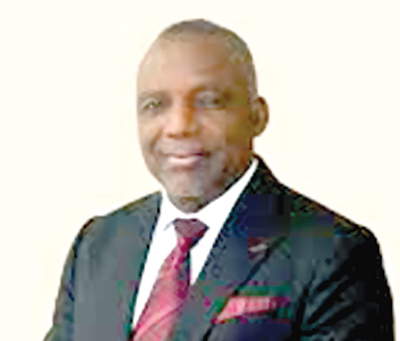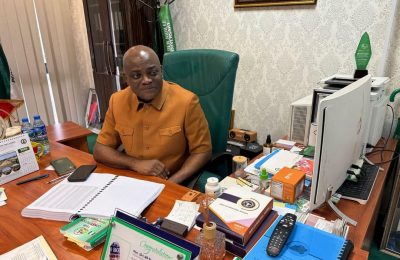Aba, a city in Abia State, is a hub for trade, industry and entrepreneurship in the southeastern region of the country but the lack of stable power supply had over the years crippled businesses until recently when the Independent Power Project (IPP) was commissioned. ADETOLA BADEMOSI writes on the project’s delivery and controversies.
The $800 million Aba Power project has been a long-awaited dream.

The 188MW Geometric Power Plant in Aba, Abia State, was initiated by Professor Barth Nnaji, a former minister of power, to address the chronic power shortage in Aba and its surrounding areas.
The Aba Integrated Power Project (IPP) was designed to supply reliable power to industries, commercial businesses, residences and other power off-takers in the Aba ring-fenced area through the construction, operation and delivery of electricity from the 140MW gas-fired power plant to all off-takers in phase one of the project.
In addition to this, the construction of over 100km of new industry-centered distribution lines will ensure the delivery of reliable, affordable power supply to several industries and large commercial entities currently poised to expand production capacity when the project is commissioned.
Also, a dedicated 27km gas pipeline according to Geometric, was constructed for the project to ensure reliable transportation of gas fuel to the power plant from Shell’s gas gathering center, also in Abia State.
Aba is renowned for its vibrant and bustling markets, which attract traders and buyers from across Nigeria and neighbouring countries.
Particularly, it is known for its thriving leather and garment industries, producing a wide variety of shoes, bags and clothing items, among others.
However, while the city is a major commercial and industrial center, it faces challenges with infrastructure, including roads, electricity and water supply.
Ordinarily, being a strong industrial base with numerous small and medium-sized enterprises engaged in manufacturing and production activities, Abia State supposed to be one of the states that should boast of high internally generated revenue (IGR).
However, this is crippled by erratic power supply, lack of good roads and other essential social amenities required for businesses to thrive. Most especially, the inadequate power supply was a major threat to business growth thus hindering the city’s economic growth.
So, the power plant which was initially scheduled to begin commercial operations in the second quarter of 2014, was finally commissioned 20 years after it was initiated.
After jubilations came controversies
In February 2024, Vice-President Kashim Shettima commissioned the project and, according to him, “Abia is making significant progress and we take pride in the achievements of Alex Otti. He has applied his extensive experience, intellect and exposure to the development of Abia State.”
Also highlighting the significance of the private sector-driven initiative, Abia State governor, Alex Otti, noted that the industrial production in Aba and its surrounding areas would triple, creating job opportunities running into millions. He assured that the project would serve as a clear signal to both local and international investors, portraying the city as a thriving business hub.
“When I first reviewed the proposal for the Geometric Integrated Power Plant, I recognised the immediate need for my involvement because, even if just 50 percent of the proposed objectives could be realised, the industrial output in this significant city and its surroundings would witness a threefold increase, resulting in the creation of millions of new jobs directly and indirectly in the short to medium term.”
However, within 24 hours of the project commissioning, stakeholders in the electricity supply industry raised questions on the circumstances that led to the project’s delay. According to Otti, the unfortunate sale and resale of the Aba Invest Island was one of the factors that contributed to the delay apart from funding.
He disclosed that Professor Nnaji had approached him as Executive Director of First Bank to appeal that the former bank that was funding the project had stopped it mid-way, owing to the global economic crisis.
His words: “We processed an $85 million facility for him (Nnaji) but unfortunately, he couldn’t draw down on that facility because the board of the bank felt that because I was proceeding to Diamond Bank as CEO, it wouldn’t make any sense to allow the country to withdraw the facility when the person that was going to manage it was not there.
“I headed to Diamond Bank which was the bank that was initially funding the project. On getting to Diamond Bank, we restructured the facility and saw it to completion by October 2014, the time I left Diamond Bank.
“But a lot of things happened thereafter that made it impossible for the project to take off. There was the unfortunate sale and resale of the Aba Invest Island and that took a life of its own.”
The governor, during an appearance on Channels Television Politics Today programme recently, also noted that the divestment of Shell which owned the major oil block that was supposed to supply gas to Geometric was also a factor.
“Shell, which owned the major oil block that was supposed to supply gas to Geometric, has sold it to another company whose focus was not gas for domestic use but for export.
“By the time we took over on the 29th of May, 2023, we sat down with Geometric a few times and engaged with NNPC and NNPC deployed their partners, and gas was made available,” he added.
Meanwhile, an article, published by a national daily, not Tribune, had accused the then vice president, Namadi Sambo; Emeka Offor, DG, BPE, Benjamin Dikki, Mohammed Bello Adoke, the Attorney-General of the Federation, and Anyim Pius Anyim, former senate president, of frustrating Nnaji and Aba Power.
The former Chairman of the Nigerian Electricity Regulatory Commission (NERC), Sam Amadi, was also not spared.
But reacting to the allegations in a lengthy write-up, Amadi explained that the contract between Professor Barth Nnaji and the Federal Government over the Aba Power project was entered in 2005, five years before he was made chairman of NERC.
“The contract was leasehold over some part of the Aba distribution area. The contract requires the Federal Government to allow Barth Nnaji to operate the two business units in Ariara and Osisioma in Aba, described as the ‘ring-fenced area’. Nnaji also has a power plant to supply power to the ring-fenced area. The contract anticipates privatisation and gives Aba Power the right of first refusal over the ring-fenced area whenever the Federal Government intends to sell the Enugu Distribution Company.
“Prof. Barth Nnaji was the Minister of Power from 2011 to 2013 when the process for privatisation was completed. He was only removed just before the winners of the bid were announced,” he had said.
He maintained that throughout the relevant period of the privatisation, Professor Barth Nnaji was minister of power and had de facto control of the Bureau of Public Enterprises (BPE) that executed the privatisation process.
“He chaired the Presidential Task Force on Power and was a key figure in the National Council on Privatisation that made key decisions about privatisation. The Director-General of BPE, Bola Onaguruwa, worked closely with him and was generally under his control as Minister of Power.
“The Minister of Power and the DG of BPE asked NERC to evaluate the assets of the 11 distribution companies (DisCos), including the Enugu Disco. There was no request to separate the ring-fenced areas from Enugu Disco for separate evaluation. The reason was that the Ministry of Power and BPE intended to privatize the entire Enugu distribution area to whoever was the preferred bidder.
“To the best of my knowledge, Professor Barth Nnaji, as part of his business plan, intended to buy the Enugu Disco. There is nothing wrong with that. He is an entrepreneur whose entry into the power sector was first as a private power producer in a deal to supply power to the Abuja metropolis. Perhaps, based on the confidence that he would win the bid he neglected or forgot to separate the Aba Ring-Fenced area from the rest of Enugu Disco before he authorized the privatisation of the entire Enugu Disco, including the Aba ring-fenced area.
“Later, when I confronted both DG BPE and Prof. Barth Nnaji on why he failed to separate the Aba ‘ring-fenced’ area from Enugu Disco before authorising privatisation, they argued something to the effect that the vice president opposed them. I have no proof of this fact.
“Professor Barth Nnaji organised a Special Purpose Vehicle (SPV) to bid for Enugu Disco, including the Aba ring-fenced area. He set up a special committee of BPE and Ministry of Power officials to evaluate the bids for the discos. After closing of bid, his SPV was adjudged the winner of the entire Enugu disco, including the Aba ring-fenced area,” he explained.
However, he denied being part of those who evaluated or chose the winner of the bid adding that few NERC staff who participated in the evaluation process were mere observers.
“…because NERC as a regulator has no responsibility to sell private public enterprises,” he noted.
Further, he said that after the evaluation and selection of Barth Nnaji’s firm as the preferred bidder, Chief Emeka Offor’s consortium petitioned on the grounds of error.
“The Presidency empaneled a special committee chaired by the Permanent Secretary of the Ministry of Power. The Chairman of NERC, the DG of BPE, and BPE consultants were members with a mandate to review the process.
“After reviewing the process, the committee agreed that Chief Emeka Offor’s consortium ought to win the bid after correcting the error. The NCP approved Chief Emeka Offor’s consortium as the winner of the bid and the preferred bidder.
“After the declaration of Chief Emeka Offor’s consortium as the winner, Bola Onagoruwa, the DG of BPE, wrote to NERC to cut off the Aba ring-fenced area from the Enugu disco area and reevaluate it for Barth Nnaji to purchase,” he disclosed.
But he said NERC had rejected the request as it would violate regulatory due process.
“You cannot conclude a sale of a territory and after the buyer has fulfilled terms and conditions you alter the sale,” he said.
Instead, he said the Commission sent a team of its technical staff to evaluate the work done by Geometric and Aba Power on the ground.
He said, “The team reported highly of the efforts of Prof Barth Nnaji and his team. Based on this report, I wrote to the CEO of Enugu Distribution Company to implement the contract between the Federal Government and Bart Nnaji by allowing Aba Power to ‘operationalize’ the contract to exercise authority over the Aba ring-fenced area as a lessee.
“Nnaji proceeded to court against the Federal Government for violating the lease agreement. Later, Emeka Offor joined the suit. NERC was not part of the suit and had nothing to do with the contest between both parties.”
Regardless of these controversies, the delivery of the project, which currently supplies 141MW power across nine local government areas within the Aba ring-fenced zone is no doubt one of the goals of the Electricity Act 2023.
Not only that, the project in addition to increased power supply and reliability, is expected to enhance industrialisation efforts and increase production of small and medium-scale enterprises, as well as local industries.







